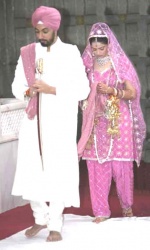Template:Did you know: Difference between revisions
From SikhiWiki
Jump to navigationJump to search
Hari singh (talk | contribs) No edit summary |
Hari singh (talk | contribs) No edit summary |
||
| Line 1: | Line 1: | ||
---- | ---- | ||
{{aowhy|[[Template:Did you know|Did you know...]]}}<div style="background-color:#FFFFEC;"> | {{aowhy|[[Template:Did you know|Did you know...]]}}<div style="background-color:#FFFFEC;"> | ||
* .... that [[Pandit Kirpa Ram]] was at the head of the group of [[Kashmiri Brahmins]] who came to see [[Guru Tegh Bahadar]] at [[Anandpur sahib]] in May 1675 for protection against the atrocities of [[Aurangzeb]]. Also that Pandit ji was [[Guru Gobind Singh|Guru Gobind Singh's]] [[Sanskrit]] teacher. | |||
*.... that [[Langar]] is a '''Sikh free kitchen''' which was started by the first [[Sikh Guru]], [[Guru Nanak Dev]] Ji in the fifteenth century. It is designed to uphold the principle of equality between all people of the world regardless of their religion, caste, colour, creed, age, gender or social status. In addition to the ideals of equality, the tradition of Langar expresses the ethics of '''sharing, community, inclusiveness and oneness''' of all humankind. "..the Light of God is in all hearts", said Guru Nanak (sggs 282) | *.... that [[Langar]] is a '''Sikh free kitchen''' which was started by the first [[Sikh Guru]], [[Guru Nanak Dev]] Ji in the fifteenth century. It is designed to uphold the principle of equality between all people of the world regardless of their religion, caste, colour, creed, age, gender or social status. In addition to the ideals of equality, the tradition of Langar expresses the ethics of '''sharing, community, inclusiveness and oneness''' of all humankind. "..the Light of God is in all hearts", said Guru Nanak (sggs 282) | ||
| Line 12: | Line 14: | ||
*..... that [[Siropa]] is a term adopted from Persian '''sar-o-pa''' (head and foot) or '''sarapa''' (head to foot) meaning an honorary dress and is used in Sikh vocabulary for a garment, scarf or a length of cloth bestowed on someone as a '''mark of honour'''. | *..... that [[Siropa]] is a term adopted from Persian '''sar-o-pa''' (head and foot) or '''sarapa''' (head to foot) meaning an honorary dress and is used in Sikh vocabulary for a garment, scarf or a length of cloth bestowed on someone as a '''mark of honour'''. | ||
<!----------------------------------Disabled ----------------------- | <!----------------------------------Disabled ----------------------- | ||
* .... that [[Pandit Kirpa Ram]] was at the head of the group of [[Kashmiri Brahmins]] who came to see [[Guru Tegh Bahadar]] at [[Anandpur sahib]] in May 1675 for protection against the atrocities of [[Aurangzeb]]. Also that Pandit ji was [[Guru Gobind Singh|Guru Gobind Singh's]] [[Sanskrit]] teacher. | |||
* .... that [[Guru Amar Das]] became [[Sikh Guru]] at the age of 73 and lived to the ripe old age of 95 years. | * .... that [[Guru Amar Das]] became [[Sikh Guru]] at the age of 73 and lived to the ripe old age of 95 years. | ||
Revision as of 08:22, 15 April 2009
Did you know...
- .... that Pandit Kirpa Ram was at the head of the group of Kashmiri Brahmins who came to see Guru Tegh Bahadar at Anandpur sahib in May 1675 for protection against the atrocities of Aurangzeb. Also that Pandit ji was Guru Gobind Singh's Sanskrit teacher.
- .... that Langar is a Sikh free kitchen which was started by the first Sikh Guru, Guru Nanak Dev Ji in the fifteenth century. It is designed to uphold the principle of equality between all people of the world regardless of their religion, caste, colour, creed, age, gender or social status. In addition to the ideals of equality, the tradition of Langar expresses the ethics of sharing, community, inclusiveness and oneness of all humankind. "..the Light of God is in all hearts", said Guru Nanak (sggs 282)
- ....that Anand Karaj is the name given to the Sikh wedding ceremony, literally translated as "Blissful Occasion". Sikhs regard marriage as a sacred bond of mutual dependence between a man and a woman.
- .... that the Panj Granthi is a pothi or small book containing five chosen texts, from the Guru Granth Sahib. The word "panj" means "five" and "granthi" is the diminutive form of "granth" (holy book)
- .... that Alahunian is the name given to the Bani by Guru Nanak. It is a composition in measure Vadahans in the Guru Granth Sahib on page Page 578 and refers to a dirge (funeral song) wailingly sung in chorus by women mourning the death of a close relation. Etymologically, the word means an "utterance in praise of a departed person".
- ..... that Siropa is a term adopted from Persian sar-o-pa (head and foot) or sarapa (head to foot) meaning an honorary dress and is used in Sikh vocabulary for a garment, scarf or a length of cloth bestowed on someone as a mark of honour.

